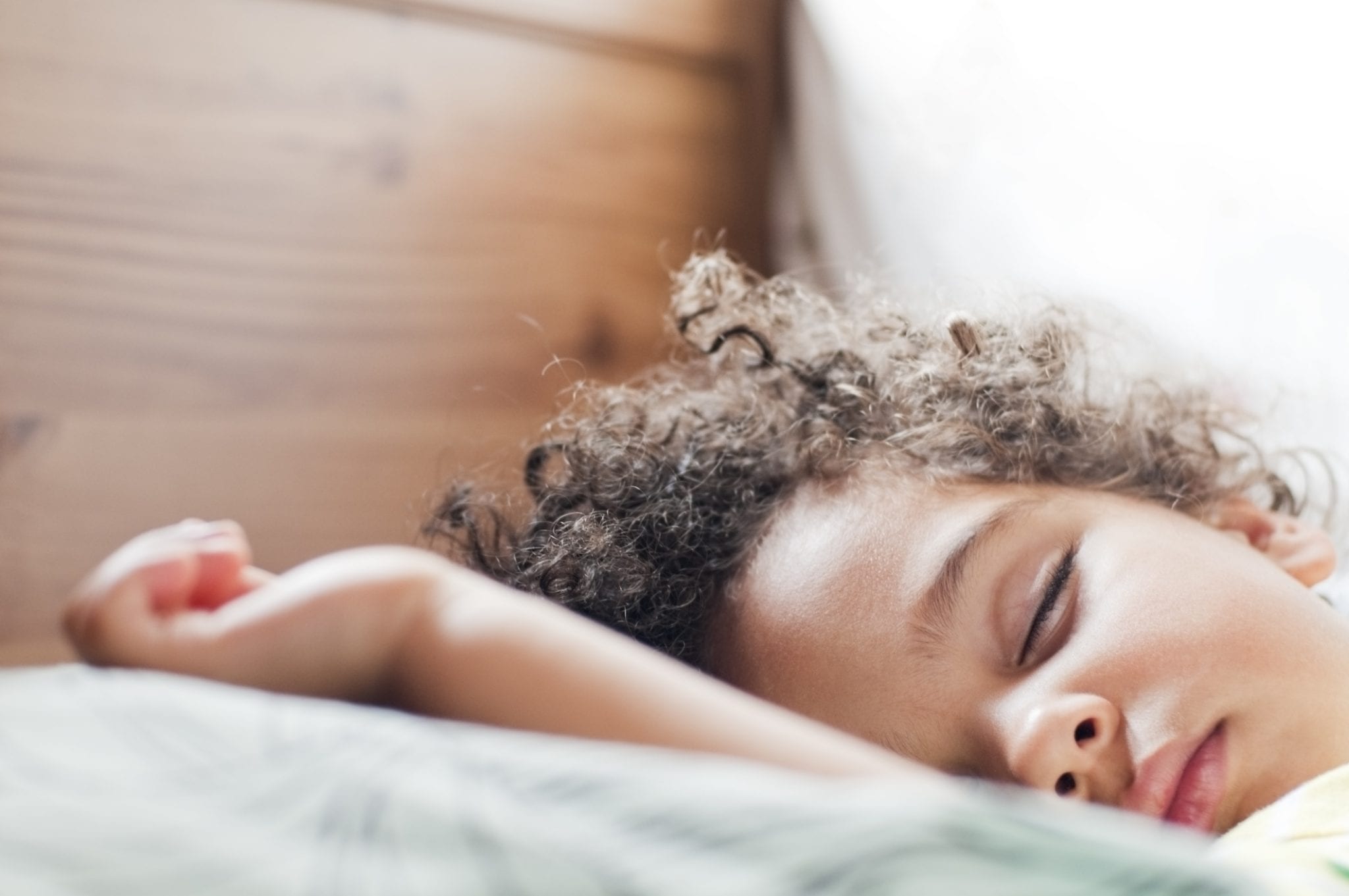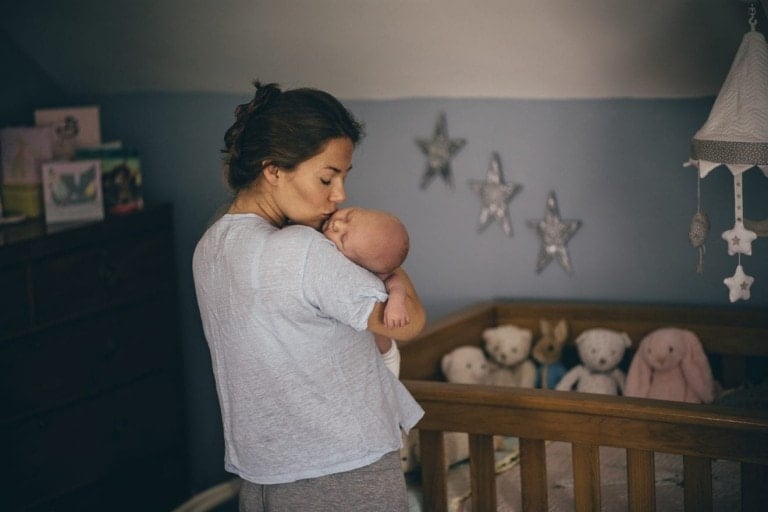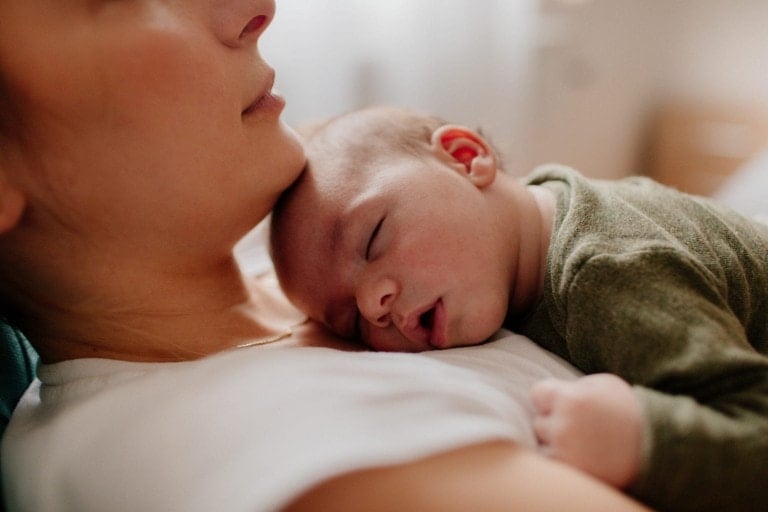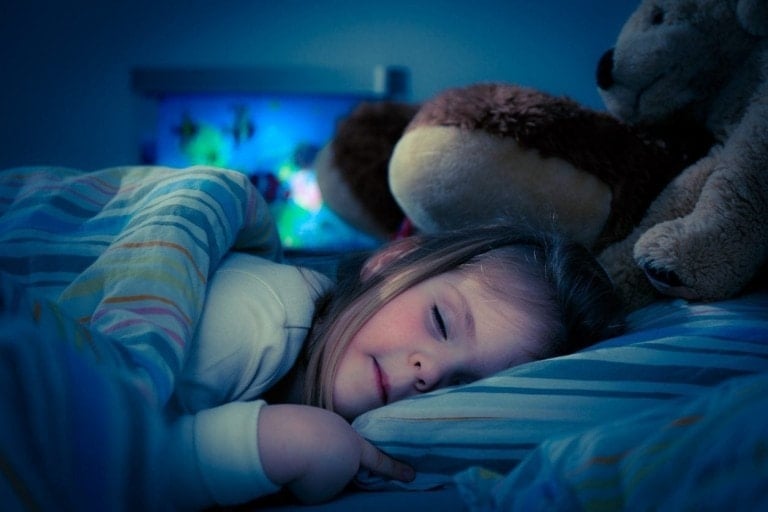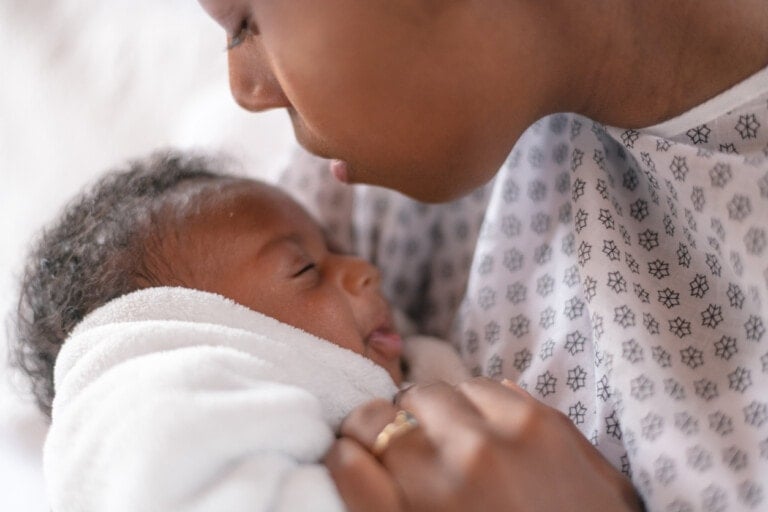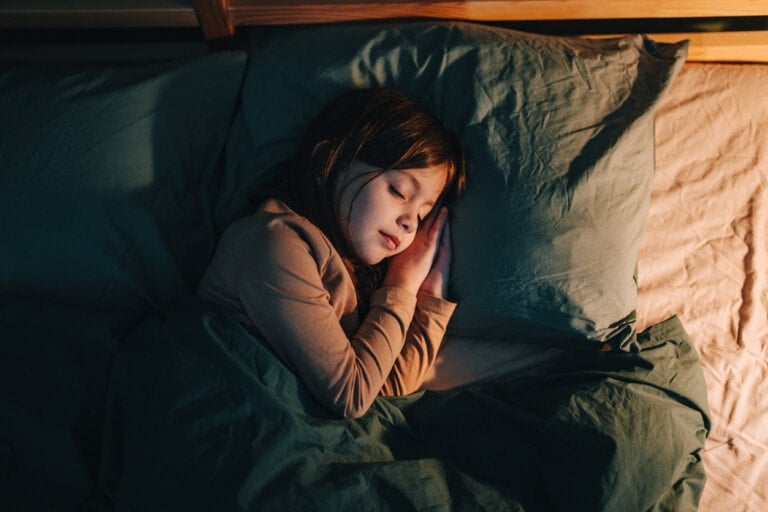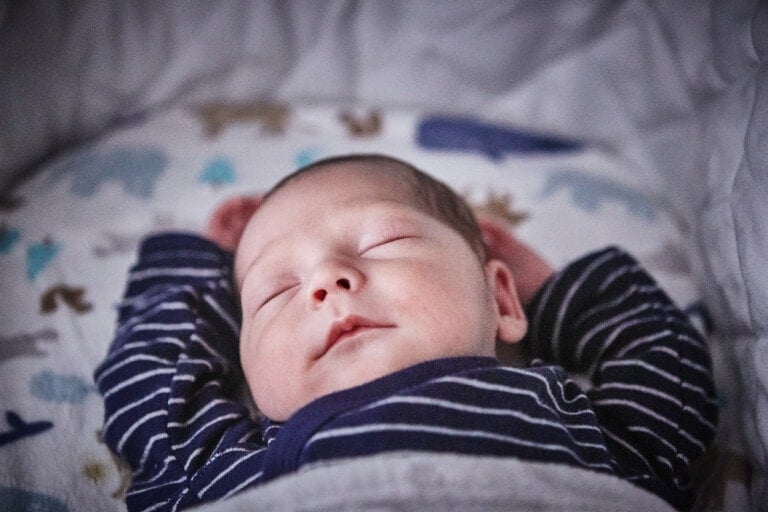For parents, why is sleeplessness a widespread hallmark of raising kids? Developmental milestones and illness can certainly cause interrupted sleep for children. But poor sleep hygiene can also be a contributing factor. Good sleep hygiene for kids includes a daily routine that promotes uninterrupted sleep, a consistent bedtime, and a sleeping environment free of things that could disturb sleep.3 So, whether your child is a baby, toddler, or older kid, how can you ensure your child is getting enough sleep? In this article, we’ll explore sleep recommendations for kids by age and provide remedies for helping your child get better rest at night and fall asleep faster.
How Much Sleep Do Kids Need?
The amount of sleep your child requires will change as they grow. Here are the recommended amounts of sleep (according to age group) for a typical 24-hour period:
Newborns 0-3 Months
Babies at this age need 14-17 hours of sleep, but some may sleep 18-19 hours.4 They sleep around the clock, waking to feed every two to three hours. If your baby isn’t waking up to feed on their own, ask their pediatrician if you need to wake them for feedings. Also, after the first few weeks, check with their pediatrician to ensure that allowing them to sleep longer at night is appropriate.
At night, newborns may wake up on their own due to hunger.5 Changes in their environment, a soiled diaper, or discomforts such as itchy skin from eczema can also wake them.1
Infants 4-12 Months
Infants between the ages of 4-12 months can sleep longer amounts at night: 12–16 hours.4 Around 6 months, most babies can sleep about nine hours at night but may still have short awakenings. Naps are very important for your baby’s brain development. Younger babies typically nap two to three times a day for a total of about three to four hours. Meanwhile, older babies have more consolidated naps. They take one to two per day for about two to three hours with a possible cat nap.15
Night wakings are common for this age group. Discomfort from teething can disrupt sleep in babies as young as 3 months.8 Other developmental milestones, such as crawling and pulling up to stand, can also contribute to sleep disturbances.2
Toddlers 1-2 Years
Children in this age group need slightly less total sleep (11-14 hours). They are in a transition period, going from two naps to one.4 For most kids, this happens around the 18-month mark, but it could happen sooner. If your baby refuses their morning nap, they may be telling you they no longer need two naps.9
Preschoolers 3-5 Years
As your little one enters the preschool years, their total amount of sleep time gradually decreases to 10-13 hours. Some children may achieve this by eliminating their naps altogether. If this is the case, you can try helping them replace their naptime with a period of quiet time.10
School Aged and Beyond
By the time your child reaches school age, naps are a thing of the past, and ensuring they get adequate sleep at night (nine to 12 hours) is critical for their continued growth and development. Things like stress from conflicts with friends, bullying, and an after-school schedule packed with homework, extracurricular activities, and screen time can lead to poor sleep hygiene for school-aged kids.11 A major sleep hygiene pitfall for kids in this age group is caffeine (which is found in coffee, tea, sodas, energy drinks, and chocolate), especially if consumed in the afternoon. Not getting enough physical activity during the day can also contribute to poor sleep.1
What Time Should Kids Go To Sleep?
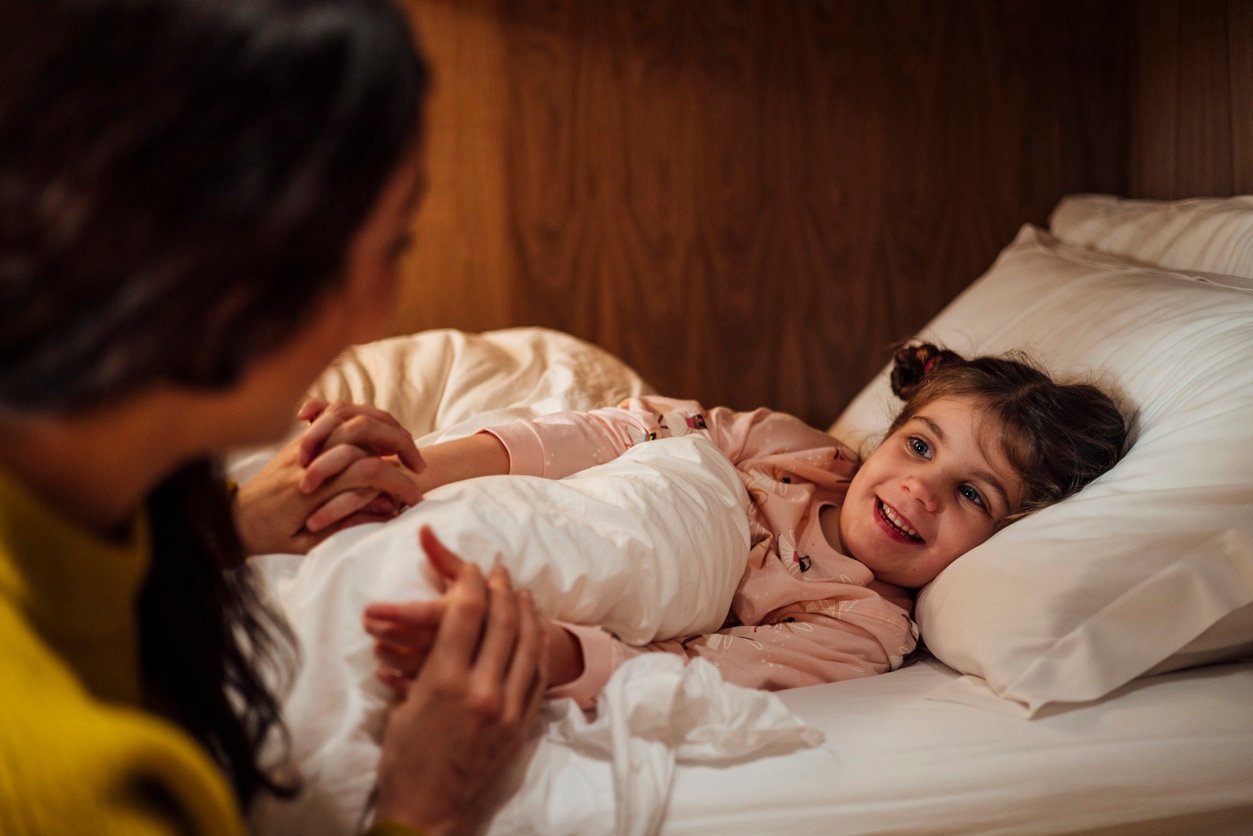
Bedtimes vary depending on your child’s age and, if applicable, when they need to wake up in the morning. For younger kids, to establish your child’s ideal bedtime, observe them for signs of sleepiness like eye rubbing, and note the time. This is approximately the optimal time for them to fall asleep on their own. You’ll want to create a bedtime routine that starts 30-45 minutes before their ideal bedtime the next night. For school-aged and older kids, giving them a heads-up half an hour in advance and a 10-minute reminder can provide guidance while giving them a sense of independence.4
What Happens When Children Don’t Get Enough Sleep?
A lack of adequate sleep can cause physical issues in children, such as headaches and nausea. It can also result in difficulty regulating emotions, increased moodiness, and irritability. This may sound familiar if you’ve ever encountered an overtired toddler!13
If your child isn’t getting enough sleep and has poor sleep hygiene, they may also be hyperactive, struggling to pay attention, and performing poorly at school.4 This is why it’s important to learn about sleep remedies for kids and teach them how to fall asleep fast. Healthy sleep habits = happy child!
How You Can Help Your Child Sleep Better
If your little one is having a hard time falling or staying asleep, try these seven sleep remedies for kids to avoid poor sleep hygiene and help them get adequate rest:
1. Help Them Fall Asleep Independently
For infants, once you’ve established a regular bedtime, you can help them learn to fall asleep independently by putting them in their bassinet when they’re drowsy but still awake.12 As long as they aren’t hungry or sick or don’t have a wet or dirty diaper, giving them time to relax on their own will encourage this skill. This way, when they wake up at night, they’ll know how to put themselves back to sleep.6 Knowing how much sleep is recommended for older kids can help you establish a scheduled bedtime that will allow your child to fall asleep fast and get enough sleep for their age.4
2. Balance Activity
Physical activity is important for healthy sleep. But for babies, avoid keeping them awake during the day to get them extra tired at night. Being overly tired can make it more difficult for an infant or a toddler to get nighttime sleep.5 To help older children get a good night’s sleep, encourage plenty of physical activity. They should get at least one hour during the day.10
3. Reduce Light Exposure
Another sleep remedy for kids is to reduce their exposure to light. Newborns are supposed to wake up at night for feedings. So, try to keep stimulation during mealtime to a minimum and use dim lighting.5 For older children, using blackout curtains or blinds in their bedroom can help minimize exposure to outside light.9
4. Establish a Familiar Bedtime Routine

Whether you’re on a mission to learn how to help your toddler get to sleep, or your older child is consistently awake way past their bedtime, establishing a bedtime routine is a key step in helping your child get enough rest. Activities such as taking a warm bath, singing a bedtime song, or reading a book can signal to your child that the day has ended and help their body prepare for sleep.4
5. Use White Noise
For children of all ages, sleep can be easily interrupted by intrusive sounds such as a neighbor coming home late at night or dogs barking. Sounds from a fan or a soothing sound machine can help kids stay asleep by masking sleep-disrupting noises.1
6. Put the Screens to Bed
The American Academy of Pediatrics doesn’t recommend screen time for kids under 18 months, except for family video calls.14 Devices that emit blue light (such as televisions, tablets, and phones) disrupt the brain’s awake/sleep cycle. This makes it harder for older kids to sleep. So, you should put screens to bed at least one hour before your child.16 Your family may decide to turn off all devices after dinner. Or, you can commit to keeping screens out of the bedrooms.
7. Talk to Their Healthcare Provider
Often, sleep troubles will improve with time. However, you should consult their healthcare provider if they occur three or more times per week and you’re concerned that your child’s quality of life and daytime functioning are being impacted. They may be able to identify health issues that could be disrupting your child’s sleep.1
Occasional sleep disruptions for children are inevitable, but that doesn’t mean you have to say goodbye to sleep as a parent. Using these sleep remedies for kids can help them (and you!) fall asleep faster. You can teach your kids healthy sleep hygiene habits that will help them get adequate sleep as they grow and for years to come.













